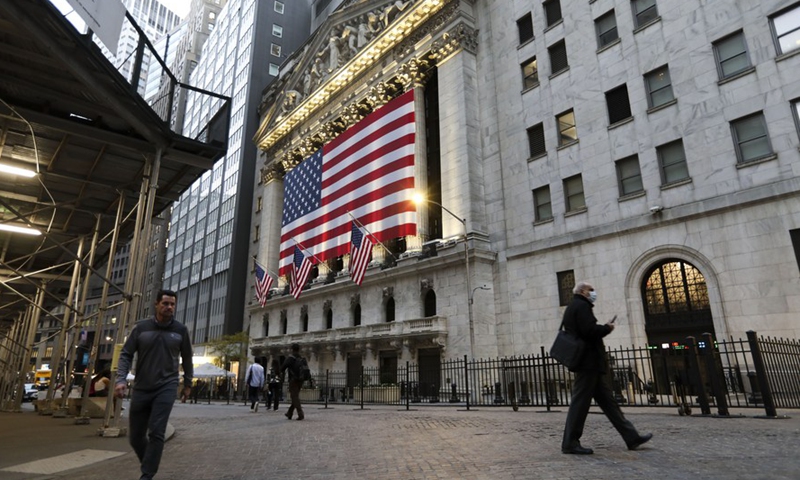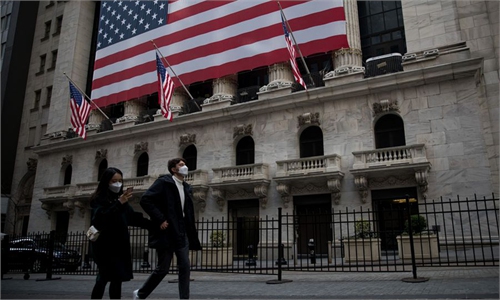Certain US politicians would prefer conflict over cooperation on audit supervision: experts

Pedestrians walk past the New York Stock Exchange in New York, the United States. File Photo:Xinhua
Certain US politicians would prefer conflict over cooperation on audit supervision and Chinese firms listing in the US should take a more proactive approach in switching to domestic stock markets, experts said on Sunday after the US Congress reportedly cut the timeline for delisting threat from three to two years.
Some politicians in Washington simply want to suppress China’s development, instead of seeking any fair competition or cooperation with China in such areas as finance, high-tech industries or trade, Dong Shaopeng, a senior research fellow at the Chongyang Institute for Financial Studies at Renmin University of China, told the Global Times.
The US Congress on Friday passed legislation to speed up the timeline for delisting Chinese companies from the American stock market if Washington regulators can’t fully review their audit work papers, Bloomberg reported.
The US considers its financial resources to be a hegemonic resource, Dong said, noting that bilateral audit supervision cooperation will encounter twists and turns in spite of a recent progress which was viewed by many as a positive step and ease of the tension between China and the US on the audit supervision topic.
Just about a week before the US Congress’ latest move, the US Public Company Accounting Oversight Board issued a report on December 15 confirming that it was able to completely inspect and investigate the accounting firms headquartered in the Chinese mainland and Hong Kong Special Administrative Region in 2022, thus vacating its relevant determinations made in 2021.
The China Securities Regulatory Commission (CSRC) welcomed the PCAOB's decision to vacate its previous determinations and said it looks forward to building on previous experience and carrying out audit oversight cooperation with the US counterparts in the years to come with enhanced mutual respect and trust, a CSRC spokesperson said in a statement one day later on December 16.
China has been intending to establish a coordinated regulatory mechanism with the US and improve the regulatory mechanism from the perspective of the protecting investors’ interests, Dong said, however, the US has attempted to extend its long-arm jurisdiction in the area and crack down on Chinese companies.
US capital markets have become politicized, and its once advocated “free market and free competition” has been undermined, Dong Dengxin, director of the Finance and Securities Institute of the Wuhan University of Science and Technology, told the Global Times on Sunday.
As for Chinese companies listing in the US, it is suggested they could take more proactive approach to return to bourses in the Chinese mainland or Hong Kong Special Administrative Region for a dual or secondary listing, experts said.
The bourse in Hong Kong is as internationalized and liberalized as American stock markets, and Chinese companies could continue to enjoy the international listing treatment after coming back to Hong Kong, Dong Dengxin said.
As of March, a total of 19 US-listed Chinese firms had gone public in Hong Kong through second listing or dual primary listing, with their total market capitalization accounting for more than 70 percent of all the over 200 US-listed Chinese firms.
Hong Kong has been well prepared for offering listing services to US-listed Chinese firms, HKSAR Finance Secretary Paul Chan Mo-po said in February.
Chinese e-commerce giant Alibaba Group has had a secondary listing in Hong Kong since 2019. Three years later, the company said in July that it is pursuing primary listing on the Hong Kong Stock Exchange and will become dual-primary listed in the US and Hong Kong after completion.
Global Times

